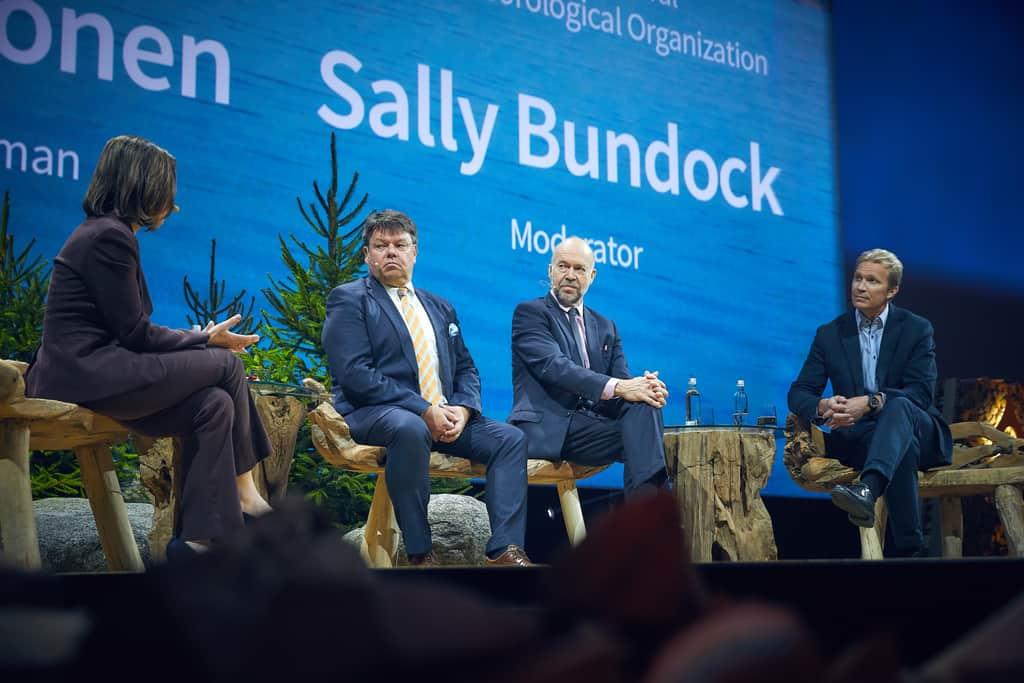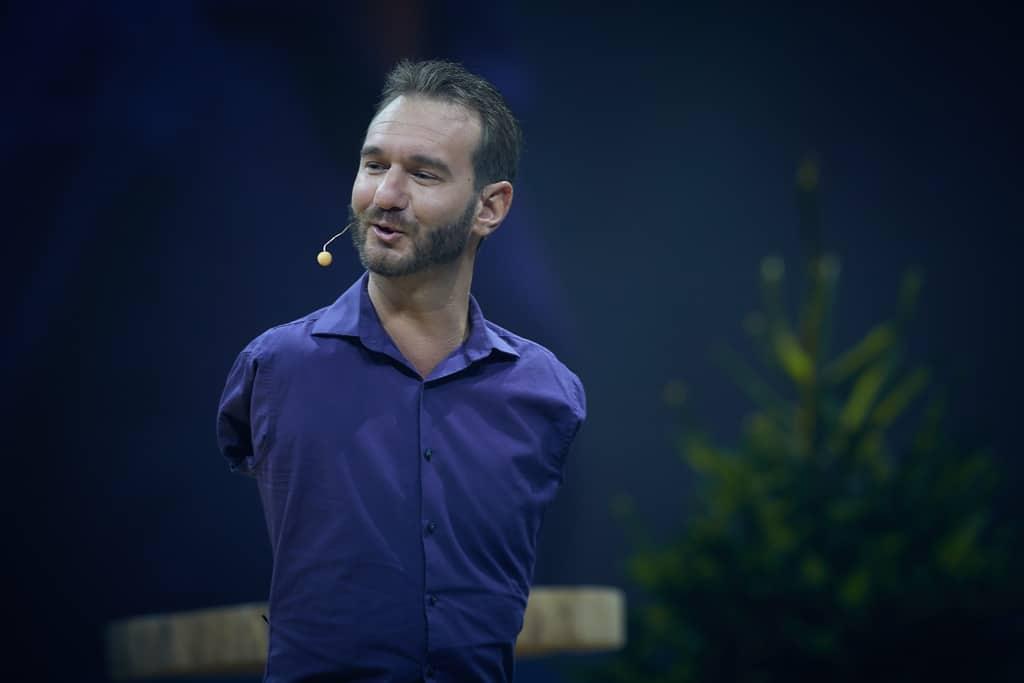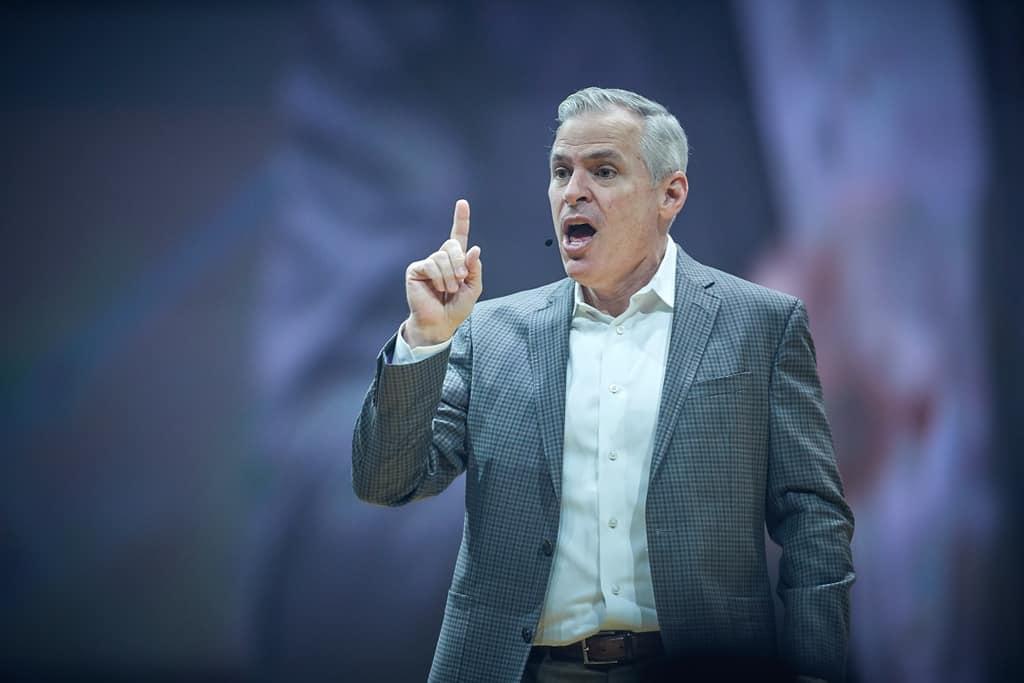4Feb2018
In a sobering keynote session, Dr. James Hansen, the former NASA scientist turned vociferous global climate change campaigner, painted a compelling vision of the effects of carbon emissions on the world’s climate system and made an impassioned plea for a global carbon levy. During the subsequent Hot Seat Session moderated by Sally Bundock, Journalist and BBC World Business Report presenter, Hansen was joined by Petteri Taalas, Secretary General of the World Meteorological Organization, and Mika Anttonen, Founder of St1, to explore some of these concepts in more detail and ask: what should be done about climate change?
Taalas began by saying that the recent series of extreme weather events experienced in 2017 were extraordinary. “We have been breaking many records with regards to hurricanes this season. This year’s hurricane season in the Caribbean and the USA will be the most expensive hurricane season ever.”
In broad agreement with Hansen about scientific findings, Taalas said that he was “slightly more optimistic about finding a solution” – provided the international community gets serious about working towards the 2˚C warming target.
The Paris Accord is a step in the right direction and the movement in the business community to now see climate change as an opportunity is promising, continued Taalas, “although maybe not moving fast enough”.
Anttonen struck a similarly optimistic tone: “I think the problem is very simple: we must take as much as possible CO2 down from the atmosphere and limit what we are putting up.”
Anttonen argued it is the role of the energy companies to extract an equivalent amount of CO2 from the air as their products are responsible for putting into it – and the role of regulation, backed up by heavy financial penalties, to force them to do this.
He called for people to take the place of multinational companies: “If CO2 is poison, why don’t we say that ‘sorry it’s not allowed to poison’? Energy demand has to be met through other methods so fossil fuel can be reduced. The second thing we need to do is reforesting: let’s make the Sahara green again! Those two things could be done immediately if we want to… but we don’t want to because we want to continue our lifestyle like it is today.”
However, Hansen was quick to argue against a cap, making the point that it is impossible to cap all sources.
“India isn’t going to accept a cap. The United States emitted 25 times more carbon per citizen than India in contribution to the excess CO2 in the air today. And [Indian citizens] have every right to expect a better lifestyle. So, you can’t do it by telling this source or that source to cap their emissions because, even if they do, it reduces the demand for the fuel – then the price goes even lower and somebody else will burn it.”
Instead, Hansen reasserted the case for a carbon levy: “You have to make fossil fuels pay their cost to society. Right now, they are getting away with using the atmosphere as a free waste dump. At the moment, air pollution, water pollution, and climate change are not included in the cost of fossil fuels – so we’ve got have an across-the-board carbon fee. I don’t see any way to solve the problem without that.”
However, Anttonen challenged this notion. He gave the example of the Finnish government’s mandate that diesel must contain at least 10% of biodiesel, a figure that will rise to 20% by 2020.
“If you have this kind of mandate,” Anttonen argued, “money goes to the R&D that we desperately need. Without such a mandate there is no logic for the stock-listed companies to do anything about it.”
At this juncture, Taalas again added a note of optimism. “The governments of countries like India and China really recognize the threat of climate change,” he argued, “They have quite ambitious programs investing in renewable energy and nuclear energy.”
He also made a passionate argument for the power of the consumer: “I am personally convinced that one day we will see consumers who want to pay for carbon-neutral or low-carbon products – and I would like to see that printed on the [labels of] products that we are buying.”
However, Hansen returned to the requirement for a carbon levy: “my data is based on measurements,” he argued, “and we are not doing the job”.
Given the dearth of leadership from government, industry or international bodies, audience members were keen to hear what they could do as individuals or individual business owners.
Anttonen suggested modeling the global energy market so that the public can understand what the impact of their actions is. “We don’t have too much time to spend, but we need to model the energy system so we can see what we need to do to cut down the carbon in the atmosphere. I honestly believe that people want to do the right thing, but buying Tesla – that doesn’t really help too much.”
In terms of people power, the civil lawsuit being brought against the US government to force it to address climate change is one possible route to change that Hansen is optimistic about. “Government isn’t doing its job. It’s pretending that it doesn’t understand the problem, and we can’t let it get away with that,” he told the audience, “but I think we will get pressure from the judiciary to force the executive to do its job.”
While Hansen stressed the power of individuals to change the way government acts, Anttonen emphasized the potential power of individual action – even when making small changes.
“I think we all have to understand that the population of this planet is still growing. And, of the 7.5 billion people, more than 5 billion will live on less than €5 a day. They can’t buy electricity or cars – they cannot find a solution to the problem that they are facing daily basis. It is our responsibility to find such a solution that they can also apply. We can do plenty of things in our daily living. We can force our governments to change the rules about short-distance flights. Why, for example, do we fly from Paris to Brussels? It doesn’t make any sense when there is a rail connection available.”
However, Anttonen strongly disagreed with Hansen about the potential of a carbon levy in effecting change: “There are plenty of small things we can do – and I’m not talking about taxation systems that never ever deliver any solutions.”
Taalas made the point that “emphasizing the minimal dangers of nuclear power is a communication challenge: without the addition of new nuclear power plants, we cannot solve this problem.”
There was a general consensus on this point. Anttonen stated, “Nuclear power is necessary to have for a short time period. I don’t know how short – hopefully, as short as possible – but we do need nuclear power today.”
Hansen also agreed, saying: “10,000 people die per day from the emissions of fossil fuel burning. That’s much more than have ever been killed by nuclear power. And that’s with old technology.” However, he went on to say, “But I don’t particularly want to emphasize nuclear as a possibility; I’d rather have the business community compete based on a rising carbon price.”
This article is a part of the Executive Summary of Nordic Business Forum 2017. Get your digital copy of the summary from the link below.


